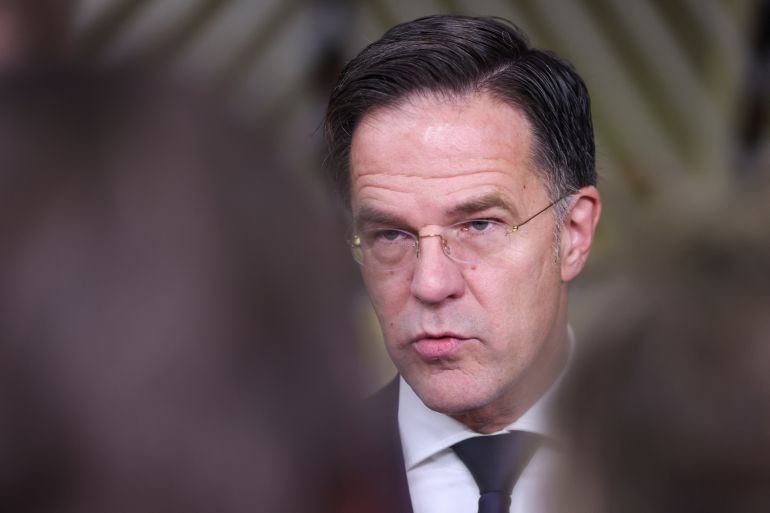US, European powers back outgoing Dutch PM Mark Rutte as next NATO head
Support of top NATO powers makes Rutte favourite to succeed current Secretary General Jens Stoltenberg in October.

The United States, United Kingdom, France and Germany have all thrown their weight behind outgoing Dutch Prime Minister Mark Rutte to become NATO’s next secretary general, at a crucial time for the alliance as Russia’s war against Ukraine rages on.
Top NATO powers on Thursday backed Rutte to succeed current chair Jens Stoltenberg when he steps down in October, putting him in a strong position to win the leadership of the transatlantic alliance.
Recommended Stories
list of 4 items- list 1 of 4Biggest NATO drills since Cold War to start next week
- list 2 of 4Turkey’s parliament approves Sweden’s NATO bid
- list 3 of 4White House condemns Trump’s ‘unhinged’ NATO comments
- list 4 of 4Stoltenberg criticises Trump’s NATO comments
Stoltenberg’s successor will take office at a crucial juncture, tasked with sustaining NATO members’ support for Ukraine’s costly defence while guarding against any escalation that would draw the alliance directly into a war with Moscow.
“The United States has made it clear to our allies, our NATO allies, that we believe Mr Rutte would be an excellent secretary general for NATO,” US National Security Council spokesperson John Kirby told journalists on Thursday.
UK Prime Minister Rishi Sunak’s spokesman said the UK “does strongly back” Rutte, adding that the UK wanted a candidate who would “keep NATO strong and deliver on the alliance’s NATO 2030 vision”.
The British Foreign Office also said Rutte was a well-respected figure across NATO, with serious defence and security credentials and who would ensure it remained strong and prepared for any need to defend itself.
A senior French official told the Reuters news agency that President Emmanuel Macron had been an early supporter of putting Rutte in the role. And German government spokesperson Steffen Hebestreit said on X that Rutte had Berlin’s backing, praising him as “an outstanding candidate”.
Diplomats have said Rutte is the only official candidate for the post in the behind-the-scenes contest, although some said the name of Romanian President Klaus Iohannis had also been floated in informal discussions recently. Other candidates may include Estonian Primer Minister Kaja Kallas and Latvia’s foreign minister, Krisjanis Karins.
But with the support of Washington – the alliance’s predominant power – and the three big European nations and some 16 other NATO members, according to diplomats, Rutte is in a commanding position.
However, some analysts believe he could face opposition from Turkey and Hungary.
‘Interesting’ job
After ruling himself out for the NATO post in previous years, Rutte, 57, told Dutch media in October that running the military alliance was a “very interesting” job and he would be open to the prospect.
The Netherlands’ longest-serving leader, Rutte has had good relationships with various British, European Union and US leaders – including Donald Trump – during his tenure.
Set to run for a second term as US president later this year, Trump drew fierce criticism from Western officials earlier this month for calling into question his commitment to defending NATO allies if re-elected.
At the weekend, Rutte urged European leaders to “stop moaning and whining and nagging” about Trump and focus instead on what they could do to bolster defence and help Ukraine.
Founded in 1949 to counter the Soviet Union during the Cold War, NATO is a political and military alliance of countries from North America and Europe.
NATO leaders are appointed by consensus, meaning all members must consent to a final decision. The alliance currently has 31 members, with Sweden poised to join soon.